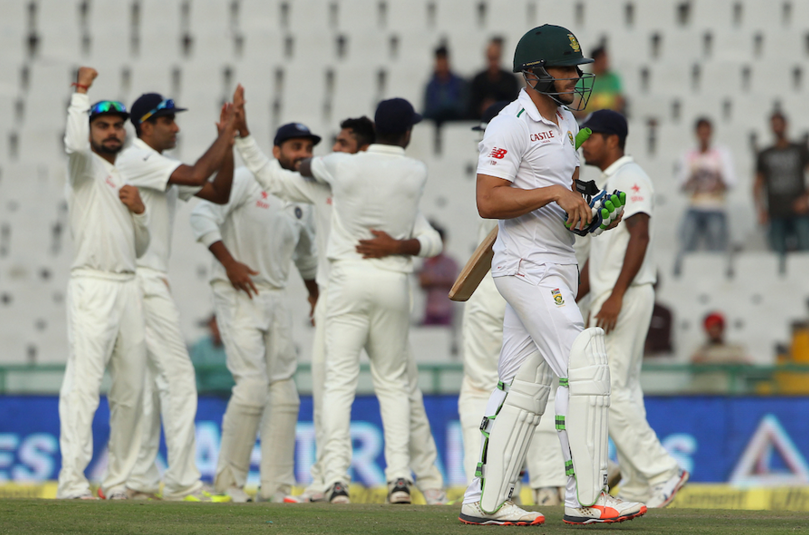The Proteas must look inward for answers after losing a Test series to India in disappointing fashion.
On 20 August 2012, the Proteas beat England at Lord’s to claim a 2-0 series victory as well at the No 1-ranking in Test cricket. In the days that followed, the senior players and coaches spoke of the achievement as if it was the first step of the journey to sporting greatness.
Graeme Smith, Gary Kirsten, Paddy Upton, Mike Horn… all involved believed that the Proteas would scale new heights in the years that followed and earn the right to be called the best team in the world. That prophecy certainly came to pass.
The Proteas beat Australia in Australia later that year. They whitewashed New Zealand and Pakistan at home in 2013. They drew with Pakistan in the UAE, and showed some ticker to down India in a truncated series in South Africa. At that point, they were the undisputed kings of Test cricket.
Then they suffered their first series defeat as the No 1-ranked team in the world. Australia outclassed them in South Africa, and Smith retired from the five-day game on a disappointing note. Several months later, they scraped to a series win in Sri Lanka.
The loss of Smith and Jacques Kallis, who retired from Tests in December 2013, was acknowledged as significant. Kirsten’s successor as coach, Russell Domingo, said it would take time to replace players of such quality and experience. Eighteen months on, and the Proteas are still struggling to plug those substantial holes.
Three years ago, Kirsten felt that the team was mentally tough. It was a quality that defined the group. Smith’s Proteas weren’t always consistent and rarely as dominant as Clive Lloyd’s West Indians or Steve Waugh’s Australians. What they were capable of doing was absorbing the pressure, and then launching a counter-offensive. They won many big Tests during that period in such a fashion.
Sadly, there’s been little evidence of that tactical nous in recent weeks. There’s been little application by the batsmen in trying conditions, and not nearly enough fight.
Hashim Amla and Faf du Plessis showed some ticker in the second innings of the third Test, occupying the crease for 42 overs during their fifth-wicket partnership. It showed that the side does have the ability to dig in.
Forget the conditions. Forget the Indian spinners, who were exceptionally accurate over the course of the series. Had there been more of the same grit and determination, South Africa may well have come out on top. As it was, the Proteas were too rash in their approach. They didn’t play like the No 1 team in the world, and deservedly lost the series.
The argument about the Indian pitches will continue to rage, and rightly so. The tracks in Mohali and Nagpur certainly weren’t up to standard. However, there’s no getting away from the fact that both teams were forced to bat on the same surfaces, and thus face the same challenges. South Africa were bowled out for 79 in the first innings in Nagpur. In their second innings, India took fewer than 21 overs and lost just two wickets to score 80 runs.
In two years’ time, we may look back at this series in India as a turning point for the Proteas. This may be the series that initiated South Africa’s fall from grace. A loss to India followed by a loss to England at home. That disappointment followed by a draw or loss to New Zealand at home, and then a loss to Australia in Australia in the 2016/17 season.
Dale Steyn has challenged all who have dared to suggest that his days as a Test cricketer are numbered. When Steyn has played, he’s offered the Proteas plenty as a wicket-taker and competitor. Unfortunately, his body is starting to have a telling say in the argument. If Steyn misses Test matches over the next 18 months as he missed two big Tests in India, the Proteas will be a less potent prospect.
The Proteas can’t control Steyn’s fate. What they can control from hereon in is their attitude. They need to get back to what worked in 2012. Their game plan against England, New Zealand, and eventually Australia needs to be based on the perseverance and tenacity that defined their previous successes.
They need to work harder to replace Smith and Kallis, and push for a suitable replacement for Steyn. Others need to step into the breach, not just as physical contributors but as players who embody that same competitive spirit.
If the Proteas don’t address their shortcomings and get their heads right soon, they will be toppled from their lofty perch. The coming summer will reveal whether they are deserving of such a position, and worthy of the title of best in the world.







